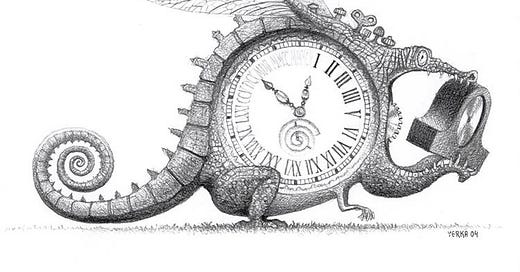#10 - Timeless, Timely, and Time-Sensitive
Telehealth FTW; Baby See, Baby Do, pt. 2; The Time-Sense of Professions
Hello, my friends,
This week has gone by leaving a puff of smoke. Ashley and I were going to spend a quiet day together with no kids on Wednesday but, alas, Ashley came home early from work on Tuesday with COVID. Michael tested positive on Wednesday, and Sophie got pink eye on Thursday. Thankfully, everyone’s symptoms have been mostly mild and, so far, I’ve escaped them all! Still, pardon me if today’s newsletter isn’t as polished as usual, I’ve been everyone’s caretaker this week and can’t be bothered to take care of polishing my sentences, too.
Telehealth FTW
One good thing about COVID is that it pushed the medical establishment to make remote doctor/nurse visits commonplace. When I brought Sophie home from school on Wednesday evening, she already had the usual pink eye symptoms (her excellent childcare were hip to it and had separated her from the other kids earlier in the day). I told Ashley that I was not looking forward to taking her to urgent care because 1) The waits can be so tedious, especially with a toddler, 2) Being surrounded by a bunch of sick kids isn’t ideal for anyone, 3) Even though I had tested negative for COVID, I didn’t want to unnecessarily and unconsciously expose others, even if I have been wearing a mask regularly. Well, Ashley the Wise said that I should try to do a telehealth appointment, instead.
So, I downloaded the app for our usual pediatric urgent care, input all the info, and waited all of five minutes before a personable nurse practitioner was on the other end of a video chat. She got Sophie’s symptoms from me, asked some questions, looked at Sophie’s eye, and just like that we had a prescription for antibiotic eye drops! And boy was I relieved to be heading to Walgreens and not a busy urgent care with a toddler in tow.
Am I going to opt for telehealth for cut-and-dry issues for the kids (and myself) from now on? You bet. Medical offices are for the birds!
Baby See, Baby Do, pt. 2
In issue #1 of HMF I had a segment where I told you “all of the things that my baby is up to even if the things are totally normal behaviors that babies do at that age.” Well, it’s been a couple of months and it’s time for that again:
Sophie (age 19 months) is shuffling her way to a run.
Michael (age 4) said “Yes, Sir” to me the other day, which I could get used to.
Sophie is a fiend at coloring. She really enjoys settling down with a crayon and a sheet of paper.
Michael can sort a pile of clothes into containers of like clothes (shirts, pants, underwear, socks, jackets, etc.). Don’t get me wrong, he’s done it only once or twice — his room most often resembles post-apocalyptic junkyard — but he’s able to do it.
Sophie is moving chairs over and climbing on top of them to reach high places.
Michael likes going onto the balcony to “feel the wind”.
Sophie enjoys drinking from cups, even if a quarter of every gulp ends up on her shirt. Progress is happening, though, because she used dribble 75% of each attempt.
Speaking of table stuff, we can put regular plates in front of Sophie and be mostly confident that she won’t throw them to the floor.
Michael buckles and unbuckles his own seatbelt in the car. More importantly, he does it at appropriate times!
Michael calls Raffi’s “Love Bug” the butt song because of a joke we made one time when he was three. That child has a very good memory.
Today, Michael invited his stuffed T-Rex, Dino (pronounced dee-no), to the table for lunch and insisted that I give him a plate of apple bread that we baked this morning and share my coffee with him.
The Time-Sense of Professions
It was the late anthropologist Edward T. Hall’s highly engaging book The Dance of Life that introduced me to thinking about the intersection of time and culture. Recently, in reading Mihir A. Desai’s The Wisdom of Finance, I entered that mileau of thought but from a different angle. In his chapter, “On Value,” Desai highlights a difference between accounting and finance: In accounting, value as recorded on a balance sheet is derived from the acquisition price and sticks to what can be assessed precisely. “As such,” Desai writes, “accounting and balance sheets are static and backward-looking by their nature”(64). Finance, on the other hand, sees value as the projected future returns on assets or investments, thus, “Finance is completely and ruthlessly forward-looking. The only source of value today is the future” (65).
This dichotomy got me thinking archival time — something well-known to folks who work in archives, even if it’s by different names. Archival time is a chronological dimension of thought that focuses on past and long-term future preservation practices as it relates to collections. By definition it’s longer than what most of us consider on a daily basis. For instance, when I worked at the Pacifica Radio Archives, I would constantly be forced to confront past conservation decisions as well as how anything I did would be understood by archivists examining (or trying to find) the same materials in 50 years. So, when I made metadata changes in the catalog or adjusted the way something was stored, how would that affect the its discoverability far into the future?
Other professions have a much different time-sense. Think about short-order cooks whose decisions can fit within the five or ten minutes it takes to make bacon and eggs, or toll booth operators who need not think beyond a transaction (and maybe cashing out at the end of the shift). Time plays a huge part in both of these examples but, in contrast to archivists or financiers, whose time-senses are long in scale but in opposite directions, the time-senses of short-order cooks and toll booth operators are, while directionally foreword, also extremely short by design.
Auditors and actuaries are interesting cases under this rubric because while they also look in opposite directions (auditors must focus backward while actuaries look forward), their scales are variable. Auditors might be reviewing the finances of an organization for the past year or the past ten years, likewise, actuaries need to estimate probabilities of occurrences at assorted intervals. I’m sure there are also professions that look in variable directions and have a more or less fixed scale — public librarians and journalists to name a couple. I anticipate that looking deeper into the time-sense of professions would lead to a multi-dimensional representation, but I think this short foray into the philosophy of time and occupations is enough for my little newsletter.
Unwittingly, I dashed off an essay where I expected to put down a paragraph or two. Why? What makes the time-sense of professions important? I’ll say that it isn’t necessarily the professions, they’re just an in-road into a bigger topic that’s of real vitality to us. I’ve often thought, and occasionally expressed that one of the real challenges and limitations of human nature is our capacity for long-term thinking. For various reasons both changeable and not, many people live in a short-order world, unable or unwilling to stretch into archival time, much less the long now. This problem concerns plebeian issues like heartburn as well as further concerns like society and individual’s inadequate retirement planning, not to mention that if we don’t prioritize long-term thinking, we’ll face a much more ominous future: Extinction.
Okay, okay, sorry, you can go back to eating your triple-fried hotdog. You’re at the County Fair!
—
p.s. - In case you’ve ever wondered what I listen to when I write these newsletters, it’s often “Live at Vidro ‘77” by Ryo Fukui, a spare and lovely jazz recording. Though during the final section of this issue, DJ YouTube served me “The Universe Smiles Upon You” by Khruangbin, a genre-defying funkadelic record with light post-rock vibes, that I ate up (no crumbs left).
p.p.s. - I’m taking a free, non-credit online anger management course through the Glendale College Parent Education Association (GCPEA) every Tuesday from 7-9p. It’s open enrollment so folks can join at any time (it runs until 6/13). So far we’ve had two sessions and I’ve learned (and applied) some useful stuff already. If you’re a parent and/or know a parent who could benefit from tips on how to channel anger mindfully, let me know and I’ll show you how to join the class.








Snail! Yum-yum - I'll have it as a garnish to my triple-fried hotdog.